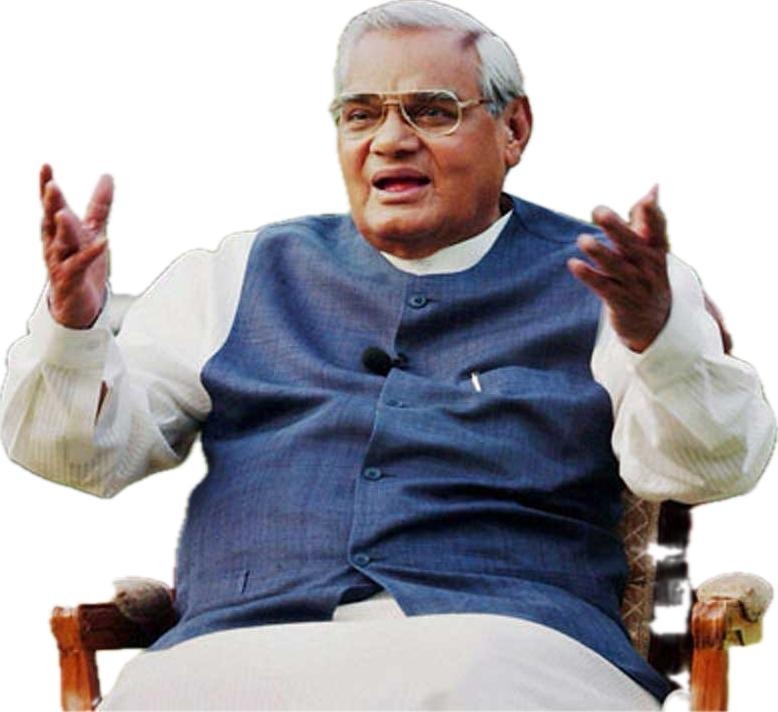Atal Bihari Vajpayee: Poet, Prime Minister, Statesman

Atal Bihari Vajpayee, India’s tenth Prime Minister, wasn’t just a politician; he was a poet, a statesman, and a leader who captivated the nation with his eloquence and vision. Born on December 25, 1924, in Gwalior, India, Vajpayee’s life was an intricate tapestry woven with the threads of politics, poetry, and a deep love for his country.
Early Life and Political Beginnings:
Vajpayee’s journey began amidst the fervor of India’s freedom struggle. Drawn to the cause, he joined the Rashtriya Swayamsevak Sangh (RSS) as a teenager and later became a prominent figure in the Bharatiya Jana Sangh, the political arm of the RSS. His oratory skills blossomed during this period, captivating audiences with his fiery speeches and evocative verses.
From Activist to Prime Minister:
Vajpayee’s political path was marked by both triumphs and challenges. He actively participated in India’s freedom movement, even facing imprisonment for his convictions. After independence, he rose through the ranks of the Jana Sangh, eventually becoming its president. Throughout his political career, Vajpayee advocated for a more inclusive and moderate brand of Hindutva, distancing himself from the party’s hardline image.

His moment of reckoning arrived in 1996, when the Bharatiya Janata Party (BJP), the Jana Sangh’s successor, emerged as the largest party in the Lok Sabha. Despite initial apprehensions, Vajpayee, with his conciliatory approach, was sworn in as Prime Minister, leading a fragile coalition government.
A Prime Minister for All:
Vajpayee’s tenure as Prime Minister was marked by significant shifts in India’s domestic and foreign policy. He ushered in an era of economic liberalization, paving the way for India’s economic boom in the 21st century. On the international front, he pursued a policy of “engagement and dialogue,” strengthening India’s relationships with its neighbors and the global community.

But Vajpayee’s legacy transcends policy changes. He was a leader who believed in building bridges, reaching out to political opponents, and fostering national unity. His iconic Lahore bus journey in 1999, aimed at improving India-Pakistan relations, remains a testament to his commitment to peace and dialogue.
Beyond Politics:
Vajpayee wasn’t just a politician; he was a man of letters. His poems, imbued with patriotism and a deep understanding of human emotions, resonated with people across the political spectrum. He was also a skilled orator, his speeches leaving audiences mesmerized by his wit, wisdom, and poetic flair.
A Lasting Legacy:
Atal Bihari Vajpayee’s life and career offer a captivating narrative of a man who rose from humble beginnings to become one of India’s most beloved leaders. He was a politician who dared to dream, a poet who painted visions of unity, and a statesman who steered India towards a more prosperous and inclusive future. His legacy continues to inspire generations of Indians, reminding them of the power of words, the importance of dialogue, and the enduring spirit of a nation.

However, here are a few of his most widely remembered and quoted lines, each carrying significant weight:
डॉक्टर राजेंद्र प्रसाद: सादगी का सितारा, नवजात भारत का मार्गदर्शक (Dr. Rajendra Prasad: Star of Simplicity, Guiding Light of a Newborn India)
On peace and dialogue:
- “Kashmiriyat, Insaniyat, Jamhuriyat” (Kashmiri identity, humanism, democracy): This iconic phrase,uttered during his visit to Kashmir in 2003, emphasized the importance of respecting Kashmiri culture and finding a peaceful solution to the conflict.
- “Let no one challenge India’s secularism”: A powerful declaration of his commitment to India’s secular fabric, highlighting the importance of tolerance and inclusivity.
- “Peace is not merely the absence of war, but the presence of justice”: This thought-provoking quote emphasized the need for deeper solutions to conflict than simply the cessation of hostilities.
On leadership and vision:
- “I dream of an India that is prosperous, strong and caring… An India that regains its place of honour in the comity of great nations”: This visionary statement encapsulated his aspirations for India’s future on the global stage.
- “Our aim is not to build an empire, but to empower people with the ability to improve their lives”: This quote reflected his focus on improving the lives of ordinary citizens and promoting social justice.
- “You can’t separate peace from freedom because no one can be at peace unless he has his freedom”:This powerful statement highlighted the interconnectedness of peace and freedom.
Other notable quotes:
- “Satta ka khel chalega, aata jati rahegi” (The game of power will go on, seasons will keep changing): A philosophical reflection on the transient nature of political power.
- “Khel hi nahi, dil bhi jeeto” (Don’t just play the game, win hearts too): This advice, given to the Indian cricket team before their tour of Pakistan,emphasized the importance of sportsmanship and building bridges.
- “Truth cannot be hidden for fear that somebody would exploit it”: A powerful statement on the importance of honesty and transparency.

Ultimately, the “most famous” statement will depend on individual perspectives and context. However, each of these quotes offers a glimpse into Vajpayee’s wisdom, vision, and commitment to a better India.

[…] Beyond Politics: The Poetic Soul and Visionary Leadership of Atal Bihari Vajpayee […]
[…] Beyond Politics: The Poetic Soul and Visionary Leadership of Atal Bihari Vajpayee […]